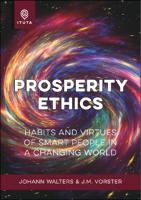Prosperity ethics
Habits and virtues of smart people in a changing world
Author(s)
Walters, Johann
Vorster, J.M.
Language
EnglishAbstract
The paradigm-shift from modernism to post-modernism and the Fourth Industrial Revolution pose enormous challenges to universal moral codes and human life today. The thesis of this manuscript is that human prosperity, in the broad sense of human flourishing in this new environment, could be enhanced by re-defining and applying universal moral codes and practising related habits to guide people to prosper and flourish as dignified human beings. In a relevant and vigorous discourse, the book engages with issues regarding morality in an age of high technology. It explores ways in which moral agents can contribute to leading post-modernist people into an environment where humans can prosper and enjoy life in a changing world where many old moral directives are not feasible anymore. This scholarly book contributes to the specific scientific discourse on studies regarding the relevant discipline and offers a new pattern of reasoning in the field of social ethics about moral agency, aiming purposefully to address particular virtues and applicable habits beneficial for human prosperity and dignified life in a changing social environment. From the perspective of applied methodology, the book is the result of a comparative literary study done from the perspective of universal moral codes, which flows from in-created natural law. Recent research results of empirical studies about the effects of the Fourth Industrial Revolution were consulted and applied to raise awareness of the deep-rooted changes and challenges in society today.


 Download
Download Web Shop
Web Shop